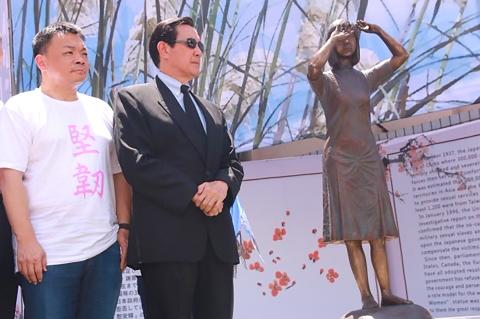The Ministry of Foreign Affairs yesterday reiterated its unwavering stance on the issue of “comfort women,” after Japan expressed “extreme disappointment” over the installation of Taiwan’s first bronze statue honoring comfort women in Tainan.
“The government has always paid close attention to the issue of comfort women. Our stance on the matter, as well as our policy to fight for their dignity, remains unchanged,” ministry spokesman Andrew Lee (李憲章) said in a news release, adding that negotiations with Japan on the matter would continue.
The government did not play a part in the erection of the statue by a civic group in Tainan on Tuesday to mark International Comfort Women Day, Lee added.

Photo courtesy of Chinese Nationalist Party (KMT) Tainan mayoral candidate Kao Su-po
The ministry’s remarks came just hours after Japan Broadcasting Corp (NHK) reported that Japanese Chief Cabinet Secretary Yoshihide Suga lamented the statue’s installation during a news conference after a Cabinet meeting in Japan.
“The establishment and exhibition of comfort women statues in various parts of the world is extremely disappointing, as it is not compatible with the position and efforts of the Japanese government so far,” Suga was quoted by the NHK as saying.
The statue in Tainan, which stands on an open space next to the Chinese Nationalist Party’s (KMT) Tainan chapter office, was erected by the non-profit Tainan Association for Comfort Women’s Rights, with assistance from the KMT.
Some Japanese media have speculated that the move was motivated by Taiwan’s nine-in-one elections in November, and was part of the KMT’s efforts to criticize the generally friendly stance of the Democratic Progressive Party administration toward Japan.
The Taipei Women’s Rescue Foundation estimates that about 2,000 Taiwanese women were forced into sexual slavery by the Imperial Japanese Army during World War II.
The Asian Women’s Fund — a quasi-public organization established by the Japanese government in 1995 to address the issue through “atonement” projects, before dissolving it in 2007 — had tried to offer Taiwanese victims compensation of ¥2 million (US$18,014 at the current exchange rate) per person and a letter of apology.
However, some Taiwanese victims refused to accept the money as they felt it did not show that the Japanese government was taking responsibility for their actions.
The Japan-Taiwan Exchange Association in Taipei yesterday declined to comment on the matter, saying only that the Japanese government had tried to address the issue through various measures taken by the Asian Women’s Fund.

INVESTIGATION: The case is the latest instance of a DPP figure being implicated in an espionage network accused of allegedly leaking information to Chinese intelligence Democratic Progressive Party (DPP) member Ho Jen-chieh (何仁傑) was detained and held incommunicado yesterday on suspicion of spying for China during his tenure as assistant to then-minister of foreign affairs Joseph Wu (吳釗燮). The Taipei District Prosecutors’ Office said Ho was implicated during its investigation into alleged spying activities by former Presidential Office consultant Wu Shang-yu (吳尚雨). Prosecutors said there is reason to believe Ho breached the National Security Act (國家安全法) by leaking classified Ministry of Foreign Affairs information to Chinese intelligence. Following interrogation, prosecutors petitioned the Taipei District Court to detain Ho, citing concerns over potential collusion or tampering of evidence. The

TRADE: The premier pledged safeguards on ‘Made in Taiwan’ labeling, anti-dumping measures and stricter export controls to strengthen its position in trade talks Products labeled “made in Taiwan” must be genuinely made in Taiwan, Premier Cho Jung-tai (卓榮泰) said yesterday, vowing to enforce strict safeguards against “origin laundering” and initiate anti-dumping investigations to prevent China dumping its products in Taiwan. Cho made the remarks in a discussion session with representatives from industries in Kaohsiung. In response to the US government’s recent announcement of “reciprocal” tariffs on its trading partners, President William Lai (賴清德) and Cho last week began a series of consultations with industry leaders nationwide to gather feedback and address concerns. Taiwanese and US officials held a videoconference on Friday evening to discuss the

NEGOTIATIONS: The US response to the countermeasures and plans Taiwan presented has been positive, including boosting procurement and investment, the president said Taiwan is included in the first group for trade negotiations with the US, President William Lai (賴清德) said yesterday, as he seeks to shield Taiwanese exporters from a 32 percent tariff. In Washington, US Trade Representative Jamieson Greer said in an interview on Fox News on Thursday that he would speak to his Taiwanese and Israeli counterparts yesterday about tariffs after holding a long discussion with the Vietnamese earlier. US President Donald Trump on Wednesday postponed punishing levies on multiple trade partners, including Taiwan, for three months after trillions of US dollars were wiped off global markets. He has maintained a 10 percent

PERSONAL DATA: The implicated KMT members allegedly compiled their petitions by copying names from party lists without the consent of the people concerned Judicial authorities searched six locations yesterday and questioned six people, including one elderly Chinese Nationalist Party (KMT) member and five KMT Youth League associates, about alleged signature forgery and fraud relating to their recall efforts against two Democratic Progressive Party (DPP) legislators. After launching a probe into alleged signature forgery and related fraud in the KMT’s recall effort, prosecutors received a number of complaints, including about one petition that had 1,748 signatures of voters whose family members said they had already passed away, and also voters who said they did not approve the use of their name, Taipei Deputy Chief Prosecutor